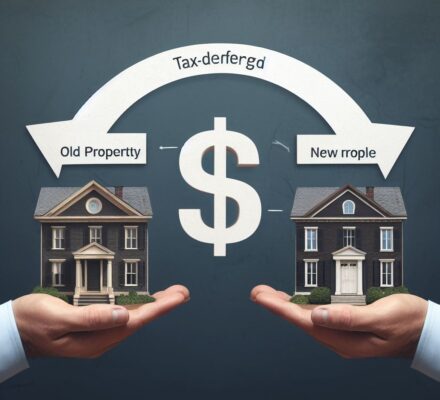Are you looking to minimize your tax liability when participating in a 1031 exchange? Look no further!
In this article, we will provide you with the 5 best tips for non-recognition of gain in a 1031 exchange.
From understanding the process to choosing the right qualified intermediary, we’ve got you covered.
So grab a cup of coffee and let’s dive in to ensure a smooth and successful exchange.
Key Takeaways
- Choose an experienced and reliable Qualified Intermediary (QI) to handle your 1031 exchange
- Carefully identify and analyze potential replacement properties based on your investment goals and objectives
- Adhere to the strict timeline requirements of the exchange, ensuring you identify replacement properties within 45 days and complete the exchange within 180 days
- Consult with a tax professional specialized in 1031 exchanges to minimize tax liability and ensure compliance with IRS guidelines
Understand the 1031 Exchange Process
To successfully navigate the 1031 exchange process, understanding its intricacies is crucial. A 1031 exchange allows you to defer capital gains taxes on the sale of an investment property by reinvesting the proceeds into a similar property.
The first step in the process is to identify a replacement property within 45 days of selling your existing property. This identification must be in writing and sent to a qualified intermediary. The replacement property must be of equal or greater value than the property you sold.
You also have 180 days from the sale of your property to complete the exchange. During this time, you must close on the replacement property and complete all necessary paperwork.
It’s important to note that the exchange must be like-kind, meaning that you must exchange real estate for real estate. Additionally, personal use properties, such as your primary residence, don’t qualify for a 1031 exchange.
Choose the Right Qualified Intermediary
When choosing the right qualified intermediary for your 1031 exchange, it’s important to consider their experience and expertise in facilitating these transactions. A qualified intermediary (QI) plays a crucial role in ensuring the success of your exchange while adhering to the strict IRS guidelines.
Here are some key factors to consider when selecting a QI:
- Experience and Expertise: Look for a QI with a proven track record in handling 1031 exchanges. They should have extensive knowledge of the tax code and regulations surrounding these transactions.
- Financial Security: Choose a QI who can provide financial security for your funds. They should have safeguards in place to protect your money during the exchange process.
- *Segregated Accounts*: Ensure the QI holds your funds in separate accounts from their own. This helps prevent commingling of funds and provides added protection.
- *Bonding and Insurance*: Verify if the QI has appropriate bonding and insurance coverage to safeguard against any potential losses.
- Customer Service: Select a QI that offers reliable and responsive customer support. Clear communication and timely assistance are crucial throughout the exchange process.
- *Availability*: Confirm that the QI is readily available to answer your questions and provide guidance when needed.
- *References and Reviews*: Research the QI’s reputation by checking references and reading reviews from other clients.
Identify the Ideal Replacement Property
Once you have completed your 1031 exchange, it’s essential to identify a suitable replacement property within the designated timeframe. This is a critical step in ensuring that you can defer any capital gains tax on the sale of your relinquished property.
When identifying the ideal replacement property, there are a few key factors to consider.
First, it’s crucial to assess your investment goals and objectives. Determine what you hope to achieve with your replacement property. Are you looking for a property with a higher potential for appreciation, or are you more interested in generating steady rental income? Understanding your investment strategy will help narrow down your options.
Next, consider the location of the replacement property. Research the market conditions, economic stability, and potential for growth in the area. A property in a high-demand location with strong market fundamentals is more likely to provide a good return on investment.
Additionally, analyze the financial aspects of the replacement property. Calculate the potential cash flow, return on investment, and any associated costs such as property taxes, insurance, and maintenance expenses. Ensure that the property aligns with your financial goals and is a sound investment.
Lastly, don’t overlook the condition and quality of the replacement property. Conduct a thorough inspection and consider any necessary repairs or renovations. A well-maintained property will attract better tenants and yield higher returns.
Follow the Strict Timeline Requirements
By adhering to the strict timeline requirements, you can ensure a smooth and successful 1031 exchange. Following these requirements is crucial to qualify for the tax benefits of a 1031 exchange and avoid recognizing gain on the sale of your property.
Here are the key timeline requirements you need to keep in mind:
- Identification Period: Once you sell your relinquished property, you have 45 days to identify potential replacement properties. This period is strict and non-negotiable, so it’s important to promptly identify suitable replacement options.
- Exchange Period: After identifying replacement properties, you have 180 days from the sale of the relinquished property to complete the exchange. This includes the purchase of the replacement property and the completion of all necessary paperwork.
It’s essential to understand that these timelines are firm and must be strictly followed. Any failure to meet the deadlines can result in the recognition of gain, leading to potential tax liability.
To ensure compliance, it’s advisable to work with a qualified intermediary who can provide guidance and help navigate the complexities of the 1031 exchange process.
Consult With a Tax Professional
To ensure the best outcome for your 1031 exchange, it’s crucial to consult with a tax professional. While you may have a good understanding of the basic rules and requirements of a 1031 exchange, the tax implications can be complex and vary based on your specific situation. A tax professional who specializes in 1031 exchanges can provide valuable guidance and help you navigate the intricacies of the tax code.
One of the main reasons to consult with a tax professional is to ensure that you meet all the necessary requirements for a successful exchange. They can review your specific circumstances and advise you on the best strategy to minimize your tax liability. Additionally, they can help you identify potential pitfalls or red flags that could trigger an IRS audit or result in a failed exchange.
A tax professional can also assist you in properly documenting your exchange to meet IRS guidelines. They can help you gather and organize all the necessary paperwork, such as purchase agreements, settlement statements, and exchange agreements. This documentation is crucial in demonstrating to the IRS that your exchange qualifies for non-recognition of gain.
Furthermore, a tax professional can provide ongoing support and advice throughout the exchange process. They can help you understand any changes in tax laws or regulations that may affect your exchange and ensure you stay in compliance.
Frequently Asked Questions
Can I Do a 1031 Exchange on a Property That Is Not Located in the United States?
Yes, you can do a 1031 exchange on a property that is not located in the United States. However, there are specific rules and regulations that must be followed for foreign property exchanges.
Are There Any Restrictions on the Types of Properties That Can Be Exchanged in a 1031 Exchange?
There are no restrictions on the types of properties that can be exchanged in a 1031 exchange. You can exchange any type of real estate, as long as it is held for productive use in a trade or business or for investment purposes.
What Happens if I Cannot Find a Suitable Replacement Property Within the Required Timeline?
If you cannot find a suitable replacement property within the required timeline, you may have to pay capital gains tax on the sale. Consult with a tax professional to explore alternative options.
Can I Use the Funds From a 1031 Exchange for Personal Use, Such as Buying a Vacation Home?
You can’t use 1031 exchange funds for personal use, like buying a vacation home. They must be reinvested in a like-kind property. Failure to do so may result in recognition of gain.
Are There Any Tax Consequences if I Choose to Convert My Replacement Property Into a Personal Residence in the Future?
If you convert your replacement property into a personal residence in the future, it could trigger tax consequences. Consult a tax professional to understand the specific rules and implications in your situation.




